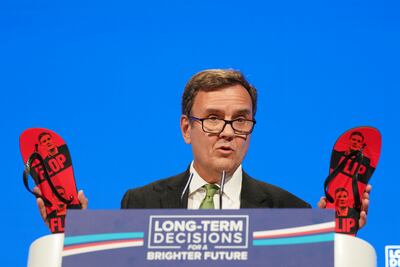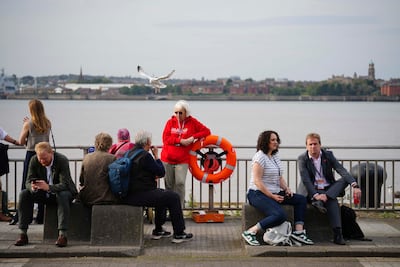When I was a White House correspondent for the BBC in Washington, one of the things I most enjoyed was the pointed wit of US presidential advisers. One was Robert Reich. He used to joke about the cliched belief of American (and British) conservatives that “smaller government” is always better.
Mr Reich, Bill Clinton’s Labour Secretary, is below average height and quipped that if Americans want smaller government, “here I am”. Another Clinton-era wit was that of Paul Begala. He summed up American (and British) politics by suggesting that it resembles “show-business for ugly people”.
Both commentaries come to mind this week during the strange annual ritual known as the British political conference season. It’s Labour’s turn now and – like the Conservatives last week – there is show-business style choreography at the proceedings. (I’ll leave judgements about ugliness to others.)

Labour is meeting in Liverpool and in a feisty mood because the party has achieved something they failed to do for years – winning big in Scotland. I was born in Clydebank on the outskirts of Glasgow and the old saying during my childhood was that on “Red Clydeside” Labour didn’t count votes. They weighed them instead. Over the past two decades, the Scottish National Party destroyed that complacency.
From 2015, the familiar wisdom among Scottish political observers was that you could find more giant pandas in Edinburgh Zoo (two) than Labour MPs from Scotland (one - out of 59 Scottish seats). But in last week’s by-election in Rutherglen, on the outskirts of Glasgow, Labour won a handsome victory. They now have two MPs north of the border while the SNP performed poorly and look tired and out of touch after 16 years in power. The Conservatives meanwhile are a minority party in Scotland.

In the Rutherglen election they managed just 1,100 votes, and embarrassingly lost their deposit. That’s the £500 a candidate pays to enter the race. It’s normally refundable, except if the candidate polls less than 5 per cent. The Conservative reached only 3.9 per cent. Meanwhile, in England, the Conservative heartland, a number of their MPs will not run again in 2024. The party looks so divided and desperate that prime minister Rishi Sunak claims that after 13 years in power they are now miraculously the party of “change”.
He said: “I want to change things. I want to do things differently and ultimately do what I believe is right in the long term.” It’s difficult for Mr Sunak to represent “change” since he has been a key player in backing Conservative policies for years. And his supposed “long term” thinking jars with his decision to cancel HS2, the biggest long term infrastructure project in England this century.
It’s the high-speed rail link which promised to connect central London to the great cities of the north, including Manchester. It’s difficult to believe that competent political advisers persuaded the British prime minister that he should use his own party conference in Manchester to announce the axing of fast train links so desperately wanted by so many residents of that great city. What were they thinking?
And as for “long term” planning, Mr Sunak suddenly cancelled a two-decades long building project of historic proportions to divert the money supposedly “saved” to small scale road improvements, local train lines and subsidies for bus fares. Long-term thinking means building for the future. Promising cheaper bus tickets next month is definitely not long-term thinking.
Moreover, Mr Sunak’s party colleagues do often pay lip service to Robert Reich’s conservative theme of “smaller government”, but even when it comes to “shrinking the state”, that’s not obvious from his policy decisions.
Mr Sunak suddenly announced a massive government anti-smoking drive aimed at young people. I happen to support his anti-smoking measures but traditional Conservatives usually call this kind of government intervention the “Nanny State” and “Big Government”.
And so Paul Begala’s sense of party politics as unattractive show-business – political posturing on stage – appears all around us. We watch these political performers, but the script is at times incomprehensible and the reviews are often poor.
The Conservatives even argued about whether multiculturalism in Britain has failed, an utterly bizarre discussion when the prime minister has South Asian roots. The impression from the Conservative conference therefore has been one of “change” – only in the sense that Mr Sunak’s ambitious colleagues are jockeying for position to change their leader – as seems likely – if he loses the next election.
As for Labour, their leader Keir Starmer is for many voters still unimpressive, and so the party conference will showcase what they see as his fitness to govern and his potential as a winner. (Although, it may not bode well that Mr Starmer’s speech in Liverpool began with a protester running onto the stage and throwing glitter at him.)
That’s why Labour’s success in Scotland is so important. Many Scottish voters seem to have come back to Labour after flirting with the SNP. The idea of Scottish independence has been postponed. A good showing in Scotland is essential if Labour wants to win power at Westminster, and that now seems within the grasp of Keir Starmer. His challenge is not only to echo the call for change. It is to demonstrate that he and his party are the change that is necessary for the whole UK.


